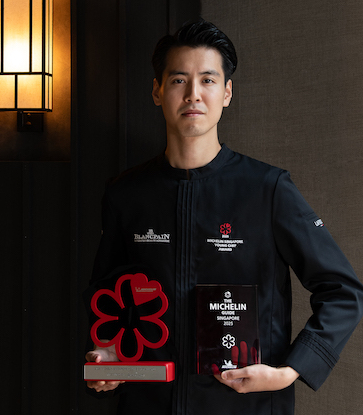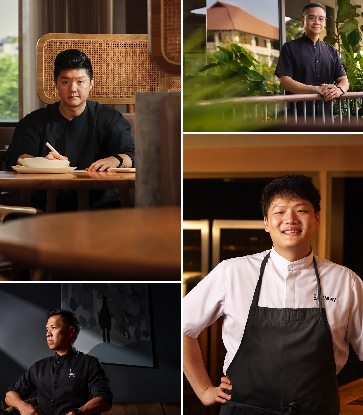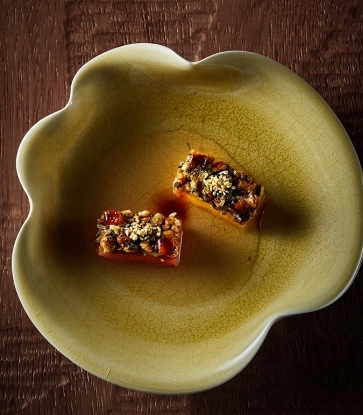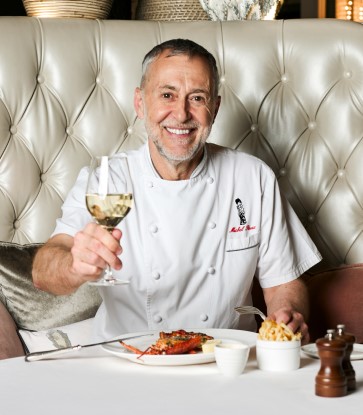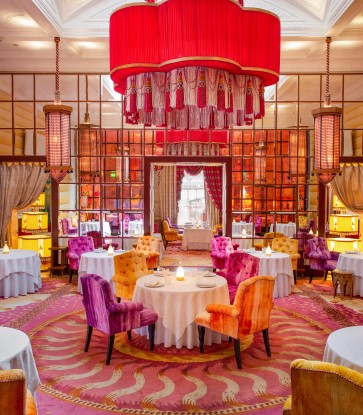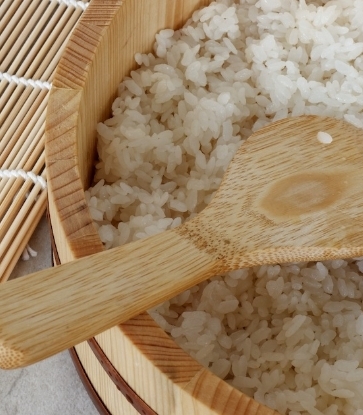Making these tasks more unusual is that they do not even take place at Armstrong’s 28-seat restaurant in HongKong Street. Instead, they are part of a month-long kitchen stage (an unpaid internship for cooks) that he did at three-Michelin-starred French-Japanese restaurant, Quintessence in Tokyo in June.

Armstrong will be succeeded by Vianney Massot, who had helmed L’Atelier de Joel Robuchon in Singapore. Massot says that his food will be classic French with a more technique-driven approach and Asian influences. Bacchanalia will close for two weeks from 1 September and undergo a revamp to include features such as an a la carte menu, new bar seating and an extended wine section.

With his interest in French-Japanese cooking and the provenance of Japanese produce, Armstrong relished the opportunity to be part of Quintessence’s 10-man cooking brigade. The golden opportunity was sparked when Armstrong visited Quintessence for lunch last December. After bonding over the food, the chefs kept in touch through emails. After three months of correspondence, a kitchen stage opportunity emerged in June.
Armstrong clocked rigorous 14-hour shifts, sometimes coming in 15 minutes earlier to set things up. He “dipped his toes” into cooking the restaurant’s menu, from canapes, starters to main courses, and witnessed Quintessence’s head chef Shuzo Kishida’s “unreal and phenomenal” mastery of handling and roasting fish.
He says: “That month was so special as I was allowed into Kishida’s kitchen, so I pushed myself to the limit to submerge in a culture that I want to learn more about.”
The internship took up Armstrong’s off days, but that didn’t matter to him. “I don’t want to sit at the beach when I am on holiday,” he quips. “I want to work in restaurants that I find excellent to learn more about the produce and food culture. It is about self improvement and never getting too comfortable.”

Although Armstrong has spent time cooking with his Japanese hosts, he stresses that he is not keen on replicating the recipes and cooking processes, such as Quintessence’s signature low-temperature roasting of meat over a long time. Instead, he is looking for something bigger. He says: “My main objective is about understanding the chef’s mentality and attitude to approaching each day.”
To that end, Armstrong realises that Kishida shares a more in-depth relationship with his suppliers and purveyors, and has invested time in his staff so that they can better understand the produce. “It is about getting closer to farmers and being more selective of the produce, which can be challenging in
Singapore as the suppliers are mostly overseas.” He also wants to understand traditional cooking techniques and flavour combinations of using dashi and shoyu. “I want to find luxury in using simple ingredients, like how the Japanese respect ingredients and use them at the peak of seasons,” he adds.

One of the Japanese ingredients that he learnt to cook was a wild live Japanese abalone that weighed a whopping 1.5kg.
Besides giving a crash course on how its taste and texture depend on cooking time, Kishida co-created a dish, tempura-fried braised abalone with monk’s beard green shoots, snow peas and abalone liver sauce, with him. “It was such a wow moment in my life that I kept part of the abalone shell and gave it to my daughter after the trip.”
““I don’t want to sit at the beach when I am on holiday. I want to work in restaurants that I find excellent to learn more about the produce and food culture. It is about self improvement and never getting too comfortable.” - Luke Armstrong”
Besides cooking in the restaurant, he also immersed himself in Japanese food culture by visiting Tsukiji market up to three times a week. He started his days by visiting the market at 5am, taking notes on new vegetables and produce to brainstorm ideas for new dishes. After having breakfast at the nearby eateries, he would head to the restaurant at about 8am.
Besides visiting markets, Armstrong also bought books and took notes to get up to speed on the wealth of seafood species such as hata grouper, ayu (sweetfish) and hamo (daggertooth pike eel).

Although Armstrong helms a Michelin-starred restaurant, he takes pains not to show it in the kitchen. He says: “I have to earn the respect of the kitchen team from what I do in their kitchen. The harder you work, the more they will open up to talk about food.”

Now back in Singapore, he has told his kitchen team to “sharpen their knives”. He says: “We get together to talk about the quality of our products, what cooked well and can be done better.”

Armstrong is no stranger to doing kitchen stages — he has done stages at restaurants such as Le Vie in Germany and Per Se in New York when he worked in Europe for a decade. He has worked in restaurants such as Pied a Terre and The Ledbury, both in London, and the now-defunct Oud Sluis in the Netherlands.
Armstrong thinks established chefs can also take on kitchen stage. He says: “I am more confident in myself. So if something goes wrong, I can just do it again. When you are young and insecure, you’re finding your way in life. Now, I can work in any kitchen around the world. If you respect people, hard work ethic and the ingredient, you will do well.
“Young chefs should also continue doing stages. Listen to instructions and try. Be proud of what you are doing and make the most of these opportunities.”




